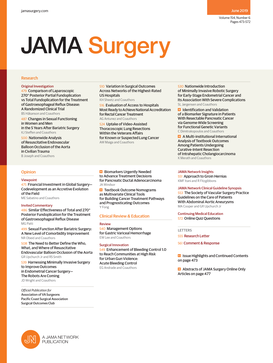Major Adverse Cardiac Events After Gastric Bypass vs Sleeve Gastrectomy.
IF 15.7
1区 医学
Q1 SURGERY
引用次数: 0
Abstract
Importance Metabolic bariatric surgery is the most effective and durable treatment for weight loss and improvement of cardiovascular diseases. With sleeve gastrectomy now surpassing gastric bypass as the most common procedure worldwide, comparing these procedures' associations with major adverse cardiac events (MACE) is needed. Objective To compare the risk of MACE among individuals undergoing gastric bypass or sleeve gastrectomy. Design, Setting, and Participants This population-based, inverse probability-weighted cohort study was conducted using administrative claims data from Switzerland among adults undergoing gastric bypass or sleeve gastrectomy for obesity treatment between January 2012 and December 2022. Inpatient individuals with a primary or secondary discharge procedure code for gastric bypass or sleeve gastrectomy were eligible for inclusion. Data were analyzed from April 2024 to September 2025. Exposure Gastric bypass vs sleeve gastrectomy. Main Outcomes and Measures A weighted cohort was analyzed to study the primary outcome of 4-point MACE, including acute myocardial infarction, ischemic stroke, hospitalizations for heart failure, and all-cause mortality. Secondary outcomes were the individual components of MACE, surgical reinterventions, and associated complications. Results Of 39 067 patients, 30 270 patients (77.5%) underwent gastric bypass and 8798 patients (22.5%) underwent sleeve gastrectomy. Median (IQR) patient age was 42 (35-50) years, and 28 560 patients (73.1%) were women. A total of 23 708 patients (60.7%) had a body mass index (calculated as weight in kilograms divided by height in meters squared) of 40 or higher. After weighting, over a median (IQR) follow-up of 5.1 years (2.6-7.6), the primary outcome occurred in 577 patients in the gastric bypass group (1.9%) and 264 patients in the sleeve gastrectomy group (3.0%), with incidence rates of 3.96 and 5.10 per 1000 patient-years, respectively (hazard ratio [HR], 0.75; 95% CI, 0.64-0.88). This difference was primarily driven by lower rates of acute myocardial infarction (HR, 0.63; 95% CI, 0.46-0.86). No differences were observed in ischemic stroke, hospitalization for heart failure, and all-cause mortality. Both short- and long-term secondary outcomes favored gastric bypass over sleeve gastrectomy, except for higher rates of revision surgery and immediate postoperative complications. Conclusions and relevance In this inverse probability-weighted cohort study, for patients undergoing metabolic bariatric surgery, gastric bypass was associated with lower rates of MACE than sleeve gastrectomy over a follow-up period of up to 11 years. Known postoperative complications were confirmed for both gastric bypass and sleeve gastrectomy.胃旁路术与袖式胃切除术后的主要心脏不良事件。
重要意义:代谢减肥手术是减肥和改善心血管疾病最有效、最持久的治疗方法。随着袖式胃切除术现在超过胃旁路术成为世界范围内最常见的手术,比较这些手术与主要心脏不良事件(MACE)的关系是必要的。目的比较胃旁路术与袖式胃切除术患者发生MACE的风险。设计、环境和参与者这项以人群为基础的逆概率加权队列研究使用来自瑞士的行政索赔数据,在2012年1月至2022年12月期间接受胃旁路或袖式胃切除术治疗肥胖的成年人中进行。有胃分流术或袖式胃切除术的初次或二次出院程序的住院患者符合纳入条件。数据分析时间为2024年4月至2025年9月。胃旁路vs袖式胃切除术。通过加权队列分析,研究4点MACE的主要结局,包括急性心肌梗死、缺血性卒中、心力衰竭住院和全因死亡率。次要结果是MACE的各个组成部分、手术再干预和相关并发症。结果39 067例患者中,30 270例(77.5%)行胃旁路术,8798例(22.5%)行袖式胃切除术。中位(IQR)患者年龄为42(35-50)岁,28 560例患者(73.1%)为女性。共有23 708例(60.7%)患者的身体质量指数(以体重(公斤)除以身高(米)的平方计算)大于或等于40。加权后,在5.1年(2.6-7.6)的中位(IQR)随访中,胃旁路组有577例(1.9%)患者出现主要结局,袖胃切除术组有264例(3.0%)患者出现主要结局,发生率分别为3.96例/ 1000患者年和5.10例/ 1000患者年(风险比[HR], 0.75;95% ci, 0.64-0.88)。这种差异主要是由于急性心肌梗死发生率较低(HR, 0.63;95% ci, 0.46-0.86)。在缺血性卒中、心力衰竭住院和全因死亡率方面没有观察到差异。除了翻修手术和术后即刻并发症的发生率较高外,短期和长期的次要结果都倾向于胃旁路手术而不是袖胃切除术。结论和相关性:在这项逆概率加权队列研究中,在长达11年的随访期间,对于接受代谢性减肥手术的患者,胃分流术的MACE发生率低于袖式胃切除术。证实了胃旁路术和袖式胃切除术的术后并发症。
本文章由计算机程序翻译,如有差异,请以英文原文为准。
求助全文
约1分钟内获得全文
求助全文
来源期刊

JAMA surgery
SURGERY-
CiteScore
20.80
自引率
3.60%
发文量
400
期刊介绍:
JAMA Surgery, an international peer-reviewed journal established in 1920, is the official publication of the Association of VA Surgeons, the Pacific Coast Surgical Association, and the Surgical Outcomes Club.It is a proud member of the JAMA Network, a consortium of peer-reviewed general medical and specialty publications.
 求助内容:
求助内容: 应助结果提醒方式:
应助结果提醒方式:


